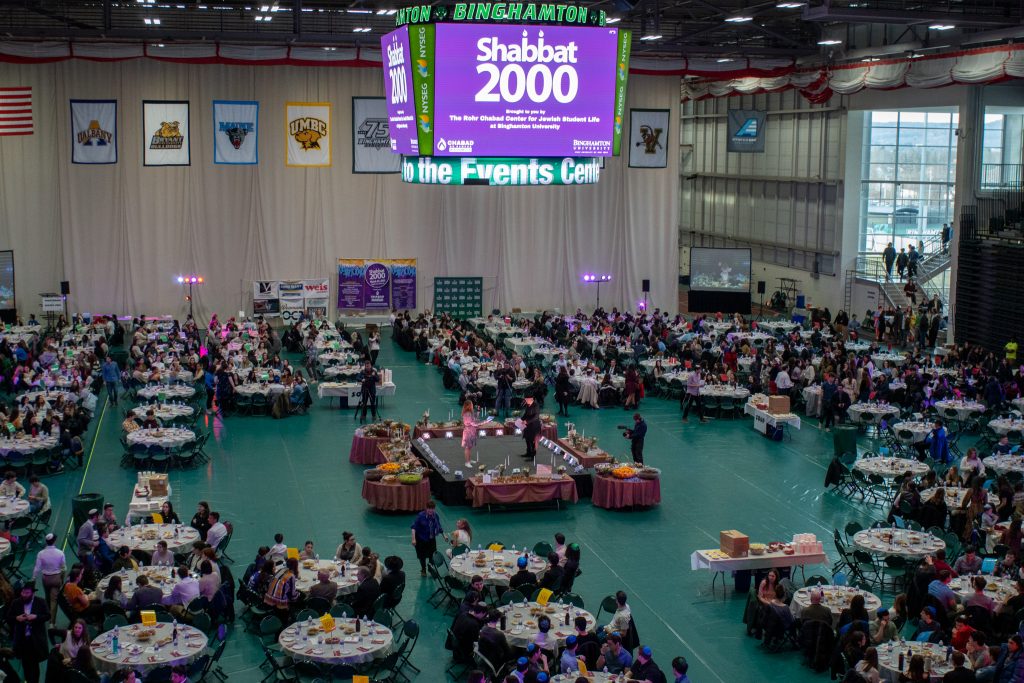The 29th-annual Shabbat 2000 was true to its name, with thousands of students gathering to participate. The celebration was held in the Events Center on campus and included food, performances, singing, dancing and much more.
Shabbat is the Jewish Sabbath, or day of rest. It takes place each week starting at sunset on Friday and ending at sunset on Saturday. Rabbi Levi Slonim, the Chabad downtown and development director of the Rohr Chabad Center for Jewish Student Life at BU, described it as one day each week that can be put aside to not do work, and instead relax, celebrate and connect with others.
“It is a command from God to rest and to disconnect from the distractions of life,” Slonim said.
During Shabbat, the Jewish community refrains from using technology for about 25 hours and instead focuses on reconnecting with each other and their faith. Shabbat has been practiced for thousands of years and is a meaningful tradition to those of the Jewish faith.
Shabbat 2000 kicked off with Rabbi Levi giving a welcoming “Shabbat Shalom” to everyone, before explaining the tradition and meaning of the event. Recognition was given to the event coordinators, as they celebrated not only reaching their goal of 2,000 people but surpassing it.
Olivia Ghodsi, a member of Chabad’s recruitment committee and a sophomore majoring in psychology, said seeing the turnout of Shabbat 2000 was a surreal feeling, being one of the people that worked hard to make sure that everyone felt welcome and was informed about the event.
“Judaism is a major part of my life, so to be able to get involved in something as meaningful as Shabbat 2000 is just a really special feeling,” Ghodsi said. “I really enjoy seeing everyone that took the time to come and appreciate this tradition.”
After welcoming the Shabbat spirit, attendees were challenged to shut off their electronics and enter the zone of Shabbat. Women were asked to gather around the parameter of the stage and light candles to signify the start of Shabbat. Everyone then returned to their seats as grape juice was poured and the hand-washing ritual commenced before the long-awaited Shabbat dinner. It consisted of bread, salad, matzah ball soup — a favorite among students — and much more.
This year’s Shabbat 2000 is especially significant because it is the Year of Hakhel, or the year of unity. This puts even more emphasis than usual on bringing together students to connect and celebrate.
The Y-Studs, an all-male Jewish a Capella group, also performed for the crowd. They sang in Hebrew and empowered the audience to get up and sing and dance with them, bringing great liveliness and fun to the event. Dance circles were formed as students joined each other to celebrate Shabbat and connect with each other like never before.
Mira Greenspan, Greek liaison of Chabad and a junior majoring in business administration, said her position is meant to be the branch between Greek life and Chabad, bringing together as many people as possible. She described Shabbat 2000 as a way for people who are unfamiliar with Judaism to join the Jewish community for a meal and learn about their traditions and celebrations.
“I think that this is a really important aspect of Shabbat 2000, just bringing everyone together,” Greenspan said. “When I’m home, I celebrate every Shabbat dinner weekly. For the tradition to be carried out when I’m at school as well, especially with such a large and welcoming community, is just a very special experience. You can hang out, sing songs and play games. The idea is to just spend time together.”
The tradition of Shabbat 2000 was originally started 29 years ago with the goal of unifying the Jewish community, as well as students of all faiths and backgrounds, to come together and celebrate. Held in the Mandela Room, the event only gathered a fraction of the attendees that it now has, gradually growing throughout the years.
Michael Kalman, a key organizer behind Shabbat 2000 — also an active member in Chabad and a junior majoring in industrial and systems engineering — spoke about the importance of taking a day to rest in the Jewish faith.
“Shabbat is the Jewish day of rest where you spend time with your family, friends and community and there’s lots of great food,” Kalman said. “We have six days during the week to do our work and to achieve things, and we have one day each week to actually take a break.”
The love and welcoming nature of Shabbat 2000 could be felt from miles away. The event unified not only those of the Jewish faith, but people of all faiths and backgrounds, to join each other for a free, meaningful meal. It was a remarkable experience to witness so many people coming together to celebrate Shabbat — taking the time to shut out the distractions of everyday life and truly connect with one another.



